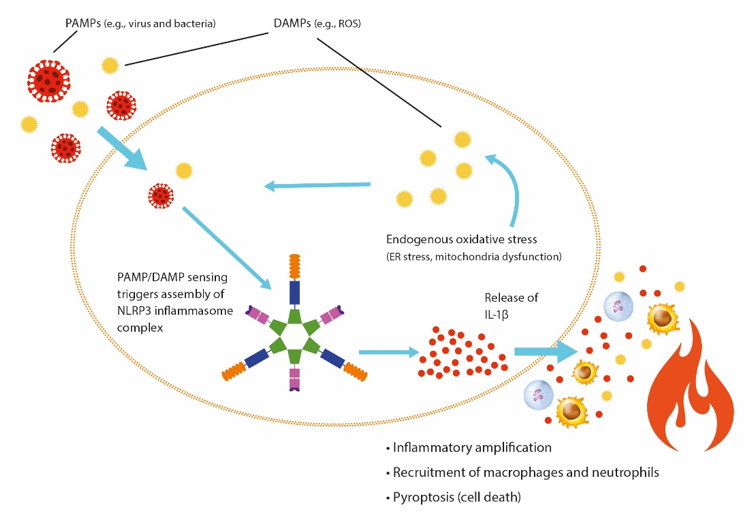|
by Lewis Chang, PhD Introduction Fun fact: Just like us humans, oysters have a sense of hearing and dislike noises. Researchers from France and Morocco conducted an experiment by exposing oysters (in this case, Pacific oysters; n=16) to different noises emitted from underwater loudspeakers and recorded shell movements using sensors attached to the shells. Within a minute these shellfish would shut their shells, particularly when hearing low-frequency noises.1 Food fact: Oysters have the highest amount of the mineral zinc per serving in any food. According to the US Department of Agriculture’s FoodData Central, one raw Pacific oyster contains 18.9 mg zinc, or 172% daily value for adults. Intimately involved in immune responses When it comes to improving immune health, many people think zinc immediately. Although zinc does not “work” alone, it is indeed vital for supporting virtually every stage of an immune response when our bodies encounter pathogens (e.g., virus and bacteria) or dangers (e.g., tissue damage caused by oxidative stress or toxins). For example:2,3
The recommended dietary allowance (RDA) for men is 11mg/day and women is 8mg/day.4 Unfortunately, dietary intake of zinc in the US has been inadequate. Older adults, vegetarians, and people with chronic inflammatory conditions or renal disease are especially at risk of deficiency.5,6 Zinc deficiency has been linked to impaired immune functions, and its clinical impact can be detrimental, such as increased susceptibility to infections including viral infections of respiratory tract, increased diarrhea and pneumonia, impaired wound healing, and increased risk of inflammatory and autoimmune disorders.7-10 Modulation of NLRP3 inflammasome activity Importantly, zinc has been shown to be involved in modulation of NLRP3 inflammasome activation, as well. Inflammasomes—of which there are several types, and the NLRP3 inflammasome is considered the most clinically relevant—are protein complexes in the cell that can sense signals from pathogens or dangers.11 Activation of inflammasomes is part of the innate immune defenses that leads to amplification of downstream inflammatory and immune responses. However, inflammasome activation is a double-edge sword; activations that are not well-regulated have been linked to not only tissue collateral damage during infections, but also immune and metabolic disorders such as autoimmune disease, type 2 diabetes, atherosclerosis, and even Alzheimer’s disease.12 Figure: NLRP3 inflammasome activation It has been demonstrated that zinc depletion in immune cells activates the NLRP3 inflammasome, induces secretion of the proinflammatory cytokine IL-1β, and contributes to inflammation.13 Fortunately, deficiency in zinc can be corrected by eating foods rich in zinc or via supplementation of zinc. In a cell model of an inflammatory condition, zinc treatment inhibited NLRP3 inflammasome activation. It was achieved via activation of the Nrf2 antioxidant pathway and reduced production of reactive oxygen species.14
Supplementation markedly improving various health outcomes There is strong clinical evidence demonstrating the benefits of zinc supplementation on immune health. Here are only some of the examples:
There is very strong evidence supporting the role of zinc in immune functions, but the benefits of zinc go beyond supporting immune health. Many studies have demonstrated the role of zinc in the management of type 2 diabetes,20 age-related macular degeneration,21 depression,22 and more. Therefore, it is important to maintain adequate dietary intakes of zinc. So next time you see oysters in a restaurant (after measures of social distancing have been lifted, or course), be sure to thank them. Or better yet, eat them! Citations
Lewis Chang, PhD is Scientific Editorial Manager of R&D at Metagenics. Dr. Chang received his PhD in Nutritional Sciences at University of Washington, along with his MS in Nutrition and Public Health from Teachers College, Columbia University and BS in Pharmacy from National Taiwan University. Prior to joining Metagenics, he conducted dissertation research and completed a research assistantship and postdoctoral fellowship at the Fred Hutchinson Cancer Research Center in Seattle, WA. Dr. Chang has authored or co-authored and managed the publication of over 30 peer-reviewed journal articles and numerous scientific abstracts and posters. He has quite a green thumb, enjoys opera, theater and jazz, and loves cooking, collecting art, and learning to play gypsy jazz guitar.
0 Comments
Leave a Reply. |
Categories
All
Archives
April 2024
|
|
Join Our Community
|
|
Amipro Disclaimer:
Certain persons, considered experts, may disagree with one or more of the foregoing statements, but the same are deemed, nevertheless, to be based on sound and reliable authority. No such statements shall be construed as a claim or representation as to Metagenics products, that they are offered for the diagnosis, cure, mitigation, treatment or prevention of any disease. |




 RSS Feed
RSS Feed